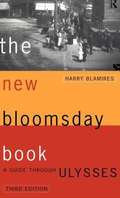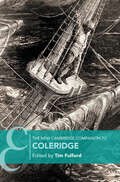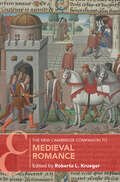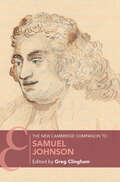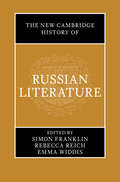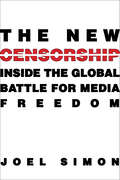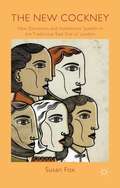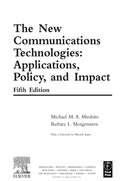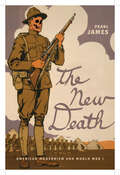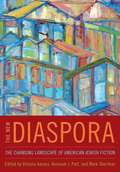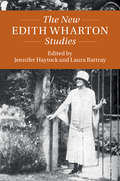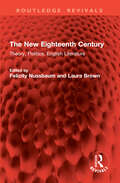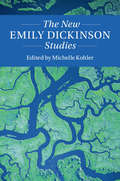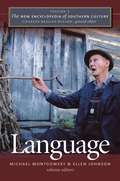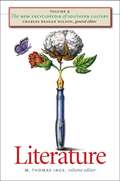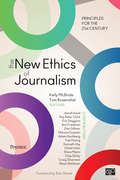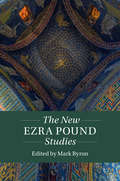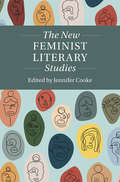- Table View
- List View
The New Bloomsday Book: A Guide through Ulysses
by Harry BlamiresThe New Bloomsday Book is a crystal clear, line-by-line running commentary on the plot of James Joyce's Ulysses which illuminates many symbolic themes and literary structures along the way.
The New Cambridge Companion to Coleridge (Cambridge Companions to Literature)
by Felicity James Tim Fulford Ewan James Jones Jeffrey N. Cox Michael Gamer Gregory Leadbetter Jeffrey W. Barbeau Nicholas Halmi Karen Swann Tom Duggett Joanna E. Taylor Thomas Owens Kurtis Hessel Jacob Lloyd Charles W. Mahoney Margaret Russett Alan VardyThis new collection enables students and general readers to appreciate Coleridge's renewed relevance 250 years after his birth. An indispensable guide to his writing for twenty-first-century readers, it contains new perspectives that reframe his work in relation to slavery, race, war, post-traumatic stress disorder and ecological crisis. Through detailed engagement with Coleridge's pioneering poetry, the reader is invited to explore fundamental questions on themes ranging from nature and trauma to gender and sexuality. Essays by leading Coleridge scholars analyse and render accessible his extraordinarily innovative thinking about dreams, psychoanalysis, genius and symbolism. Coleridge is often a direct and gripping writer, yet he is also elusive and diverse. This Companion's great achievement is to offer a one-volume entry point into his incomparably rich and varied world.
The New Cambridge Companion to Herman Melville
by Robert S. LevineThe New Cambridge Companion to Herman Melville provides timely, critical essays on Melville's classic works. The essays have been specially commissioned for this volume and provide a complete overview of Melville's career. Melville's major novels are discussed, along with a range of his short fiction and poetry, including neglected works ripe for rediscovery. The volume includes essays on such new topics as Melville and oceanic studies, Melville and animal studies, and Melville and the planetary, along with a number of essays that focus on form and aesthetics. Written at a level both challenging and accessible, this New Companion brings together a team of leading international scholars to offer students of American literature the most comprehensive introduction available to Melville's art.
The New Cambridge Companion to Joseph Conrad
by J. H. StapeJoseph Conrad's centrality to modern literature is well established. The New Cambridge Companion to Joseph Conrad provides essential guidance to varied developments in the field of Conrad studies since the publication of The Cambridge Companion to Joseph Conrad (1996). The volume's thirteen chapters offer diverse perspectives on emergent areas of interest, including canon formation, postcolonialism, gender, critical reception and adaptation. Likewise, chapters on Conrad's autobiographical writings, Heart of Darkness and 'The Secret Sharer', consider recent trends in both literary and cultural studies. A chronology and an updated guide to further reading serve to provide essential orientation to a large and complex field. This volume is the ideal starting point for students new to Conrad's work as well as for scholars wishing to keep abreast of current issues.
The New Cambridge Companion to Medieval Romance (Cambridge Companions to Literature)
by Roberta L. KruegerThis new Companion provides a broad and perceptive overview of the most important vernacular literary genre of the Middle Ages. Freshly commissioned, original chapters from seventeen leading scholars introduce students and general readers to the form's poetics, narrative voice and manuscript contexts, as well as its relationship to the Mediterranean world, race, gender and the emotions, among many other topics. Providing fresh perspectives on the first pan-European literary movement, essays range across a broad geographical area, including England, France, Italy, Germany and the Iberian Peninsula, as well as a varied linguistic spectrum, including Arabic, Hebrew and Yiddish. Exploring the celebration of chivalric ideals and courtly refinements, the volume excavates the tensions and traumas lying beneath decorous surface appearances. An introduction, bibliography of texts and translations as well as chapter-by-chapter reading lists complete this essential guide.
The New Cambridge Companion to Samuel Beckett
by Dirk Van HulleIn the past decade, there has been an unprecedented upsurge of interest in Samuel Beckett's works. The New Cambridge Companion to Samuel Beckett offers an accessible and engrossing introduction to a key set of issues animating the field of Beckett studies today. This companion considers Beckett's lasting significance by addressing a host of relevant topics. Written by a team of renowned scholars, this volume presents a continuum in Beckett studies ranging from theoretical approaches to performance studies, from manuscript research to the study of bilingualism, intertextuality, late modernism, history, philosophy, ethics, body and mind. The emphasis on burgeoning critical approaches aids the reader's understanding of recent developments in Beckett studies while prompting further exploration, assisted by the guide to further reading.
The New Cambridge Companion to Samuel Johnson (Cambridge Companions to Literature)
by Greg ClinghamStudents, scholars, and general readers alike will find the New Cambridge Companion to Samuel Johnson deeply informed and appealingly written. Each newly commissioned chapter explores aspects of Johnson's writing and thought, including his ethical grasp of life, his views of language, the roots of his ideas in Renaissance humanism, and his skeptical-humane style. Among the themes engaged are history, disability, gender, politics, race, slavery, Johnson's representation in art, and the significance of the Yale Edition. Works discussed include Johnson's poetry and fiction, his moral essays and political tracts, his Shakespeare edition and Dictionary, and his critical, biographical, and travel writing. A narrated Further Reading provides an informative guide to the study of Johnson, and a substantial Introduction highlights how his literary practice, philosophical values, and life experience provide a challenge to readers new and established. Through fresh, integrated insights, this authoritative guide reveals the surprising contemporaneity of Johnson's thought.
The New Cambridge Companion to Shakespeare
by Stanley Wells Margreta De GraziaWritten by a team of leading international scholars, this Companion is designed to illuminate Shakespeare's works through discussion of the key topics of Shakespeare studies. Twenty-one brand new essays provide lively and authoritative approaches to recent scholarship and criticism for readers keen to expand their knowledge and appreciation of Shakespeare. The book contains stimulating chapters on traditional topics such as Shakespeare's biography and the transmission of his texts. Individual readings of the plays are given in the context of genre as well as through the cultural and historical perspectives of race, sexuality and gender, and politics and religion. Essays on performance survey the latest digital media as well as stage and film. Throughout the volume, contributors discuss Shakespeare in a global as well as a national context, a dramatist with a long and constantly mutating history of reception and performance.
The New Cambridge Companion to T. S. Eliot: T. S. Eliot
by Jason HardingDrawing on the latest developments in scholarship and criticism, The New Cambridge Companion to T. S. Eliot opens up fresh avenues of appreciation and inquiry to a global twenty-first century readership. Emphasizing major works and critical issues, this collection of newly commissioned essays from leading international scholars provides seven full chapters reassessing Eliot's poetry and drama; explores important contemporary critical issues that were previously untreated, such as the significance of gender and sexuality; and challenges received accounts of his at times controversial critical reception. Complete with a chronology of Eliot's life and work and an up-to-date select bibliography, this authoritative and accessible introduction to Eliot's complete oeuvre will be an essential resource for students.
The New Cambridge Companion to: The New Cambridge Companion to William Faulkner
by John T. MatthewsThe New Cambridge Companion to William Faulkner offers contemporary readers a sample of innovative approaches to interpreting and appreciating William Faulkner, who continues to inspire passionate readership worldwide. The essays here address a variety of topics in Faulkner's fiction, such as its reflection of the concurrent emergence of cinema, social inequality and rights movements, modern ways of imagining sexual identity and behavior, the South's history as a plantation economy and society, and the persistent effects of traumatic cultural and personal experience. This new Companion provides an introduction to the fresh ways Faulkner is being read in the twenty-first century, and bears witness to his continued importance as an American and world writer.
The New Cambridge History of Russian Literature
by Emma Widdis Simon Franklin Rebecca ReichThis is the essential new guide to Russian literature, combining authority and innovation in coverage ranging from medieval manuscripts to the internet and social media. With contributions from thirty-four world-leading scholars, it offers a fresh approach to literary history, not as one integral narrative but as multiple parallel histories. Each of its four strands tells a story of Russian literature according to a defined criterion: Movements, Mechanisms, Forms and Heroes. At the same time, six clusters of shorter themed essays suggest additional perspectives and criteria for further study and research. In dialogue, these histories invite a multiplicity of readings, both within and across the narrative strands. In an age of shifting perspectives on Russia, and on national literatures more widely, this open but easily navigable volume enables readers to engage with both traditional literary concerns and radical re-conceptualisations of Russian history and culture.
The New Censorship: Inside the Global Battle for Media Freedom (Columbia Journalism Review Books)
by Joel SimonJournalists are being imprisoned and killed in record numbers. Online surveillance is annihilating privacy, and the Internet can be brought under government control at any time. Joel Simon, the executive director of the Committee to Protect Journalists, warns that we can no longer assume that our global information ecosystem is stable, protected, and robust. Journalists are increasingly vulnerable to attack by authoritarian governments, militants, criminals, and terrorists, who all seek to use technology, political pressure, and violence to set the global information agenda.Reporting from Pakistan, Russia, Turkey, Egypt, and Mexico, among other hotspots, Simon finds journalists under threat from all sides. The result is a growing crisis in information—a shortage of the news we need to make sense of our globalized world and fight human rights abuses, manage conflict, and promote accountability. Drawing on his experience defending journalists on the front lines, he calls on "global citizens," U.S. policy makers, international law advocates, and human rights groups to create a global freedom-of-expression agenda tied to trade, climate, and other major negotiations. He proposes ten key priorities, including combating the murder of journalists, ending censorship, and developing a global free-expression charter to challenge the criminal and corrupt forces that seek to manipulate the world's news.
The New Censorship: Inside the Global Battle for Media Freedom (Columbia Journalism Review)
by Joel SimonAn examination of how the media is under fire and how to safeguard journalists and the information they seek to share with the public.Journalists are being imprisoned and killed in record numbers. Online surveillance is annihilating privacy, and the Internet can be brought under government control at any time. Joel Simon, the executive director of the Committee to Protect Journalists, warns that we can no longer assume that our global information ecosystem is stable, protected, and robust. Journalists are increasingly vulnerable to attack by authoritarian governments, militants, criminals, and terrorists, who all seek to use technology, political pressure, and violence to set the global information agenda.Reporting from Pakistan, Russia, Turkey, Egypt, and Mexico, among other hotspots, Simon finds journalists under threat from all sides. The result is a growing crisis in information—a shortage of the news we need to make sense of our globalized world and fight human rights abuses, manage conflict, and promote accountability. Drawing on his experience defending journalists on the front lines, he calls on &“global citizens,&” U.S. policy makers, international law advocates, and human rights groups to create a global freedom-of-expression agenda tied to trade, climate, and other major negotiations. He proposes ten key priorities, including combating the murder of journalists, ending censorship, and developing a global free-expression charter to challenge the criminal and corrupt forces that seek to manipulate the world's news.&“Wise and insightful. [Simon] offers hope to all who care about maintaining the free flow of information in a world full of would-be censors.&”—Ann Cooper, Columbia Journalism School
The New Cockney
by Susan FoxThe New Cockney provides a sociolinguistic account of speech variation among adolescents in the 'traditional' East End of London. The study takes account of the social and economic upheaval in the area since the 1950s, primarily concentrating on factors such as the immigration of the Bangladeshi community and its effect on the Cockney dialect. By paying attention to the particular, this book contributes to a better understanding of the more general concerns of linguistic variation. With a focus on the interaction and social practices of a group of adolescents attending a youth centre, the study highlights some of the possible mechanisms for language change.
The New Communications Technologies: Applications, Policy, and Impact
by Barbara Morgenstern Michael MirabitoAs new communications applications are developed and brought to market, it is vital for communications professionals to keep abreast of these issues. Since the technologies and applications also affect our daily lives, it is important to understand how they will shape the country and, by extension, the world at large. International censorship, the impact of the Internet and wireless tools, and th legisation following the World Trade Center bombing all fall into this category.The New Communications Technologies, Fifth Edition, provides vital information on the new and emerging technologies that will shape the way communicators do business. The book explores the new communications technologies and covers topics ranging from multimedia and production to satellites to digital communication. Just as important, the book examines the social, economic, and political impact brought about by the adoption of such technologies and applications; this fallout includes privacy concerns, First Amendment issues, and the implications raised by biometric systems.
The New Death: American Modernism and World War I
by Pearl JamesAdopting the term "new death," which was used to describe the unprecedented and horrific scale of death caused by the First World War, Pearl James uncovers several touchstones of American modernism that refer to and narrate traumatic death. The sense of paradox was pervasive: death was both sanctified and denied; notions of heroism were both essential and far-fetched; and civilians had opportunities to hear about the ugliness of death at the front but often preferred not to. By historicizing and analyzing the work of such writers as Willa Cather, Ernest Hemingway, F. Scott Fitzgerald, and William Faulkner, the author shows how their novels reveal, conceal, refigure, and aestheticize the violent death of young men in the aftermath of the war. These writers, James argues, have much to say about how the First World War changed death's cultural meaning.
The New Diaspora: The Changing Landscape of American Jewish Fiction
by Mark Shechner Avinoam J. Patt Victoria AaronsThe Edward Lewis Wallant Award was founded by the family of Dr. Irving and Fran Waltman in 1963 and is supported by the University of Hartford's Maurice Greenberg Center for Judaic Studies. It is given annually to an American writer, preferably early in his or her career, whose fiction is considered significant for American Jews. In The New Diaspora: The Changing Landscape of American Jewish Fiction, editors Victoria Aarons, Avinoam J. Patt, and Mark Shechner, who have all served as judges for the award, present vital, original, and wide-ranging fiction by writers whose work has been considered or selected for the award. The resulting collection highlights the exemplary place of the Wallant Award in Jewish literature. With a mix of stories and novel chapters, The New Diaspora reprints selections of short fiction from such well-known writers as Rebecca Goldstein, Nathan Englander, Jonathan Safran Foer, Dara Horn, Julie Orringer, and Nicole Krauss. The first half of the anthology presents pieces by winners of the Wallant award, focusing on the best work of recent winners. The New Diaspora's second half reflects the evolving landscape of American Jewish fiction over the last fifty years, as many authors working in America are not American by birth, and their fiction has become more experimental in nature. Pieces in this section represent authors with roots all over the world--including Russia (Maxim Shrayer, Nadia Kalman, and Lara Vapnyar), Latvia (David Bezmozgis), South Africa (Tony Eprile), Canada (Robert Majzels), and Israel (Avner Mandelman, who now lives in Canada). This collection offers an expanded canon of Jewish writing in North America and foregrounds a vision of its variety, its uniqueness, its cosmopolitanism, and its evolving perspectives on Jewish life. It celebrates the continuing vitality and fresh visions of contemporary Jewish writing, even as it highlights its debt to history and embrace of collective memory. Readers of contemporary American fiction and Jewish cultural history will find The New Diaspora enlightening and deeply engaging.
The New Edith Wharton Studies (Twenty-First-Century Critical Revisions)
by Laura Rattray Jennifer HaytockThe New Edith Wharton Studies uncovers new evidence and presents new ideas that invite us to reconsider our understanding of one of America's most highly acclaimed, versatile, and prolific writers. The volume addresses themes that have previously been missed or underdeveloped, and examines areas where previous scholarship does not take account of key, contemporary issues: Wharton and ecocriticism, Wharton and queer studies, Wharton and animal studies, Wharton and whiteness, and Wharton and contemporary psychology. Essays explore Wharton's treatment of the poor in her emerging career, the ways in which French thinkers helped her envision community, the importance of Greece to Wharton, her transnationalism, the ongoing revelations of the author's archives, and new perspectives on her agency in the literary marketplace. It addresses key themes and examines contemporary issues, while reassessing Edith Wharton's life and career.
The New Eighteenth Century: Theory, Politics, English Literature (Routledge Revivals)
by Laura Brown Felicity NussbaumFirst published in 1987, The New Eighteenth Century (now with a new preface by Felicity Nussbaum and Laura Brown) examines eighteenth century English literature’s resistance to the application of new theoretical approaches and presents new work by leading scholars which both challenges this resistance and demonstrates the usefulness of feminist, Marxist, new-historicist, and psychoanalytic approaches to the analysis of eighteenth-century texts.This book reinterprets and resituates canonical works (by such writers as Fielding, Goldsmith, and Sterne) but also explores areas and figures increasingly important to eighteenth-century study. It opens questions about the canon and about the nature of "canonicity" itself as it considers texts by women, working-class literature, guidebooks for bourgeois tourists, and aspects of the cultural and social terrain including problems of race and colonialism, capitalism, and penal institutions.The New Eighteenth Century not only provides new ways of looking at the literature of the period but serves as a model for future work in eighteenth-century studies.
The New Emily Dickinson Studies (Twenty-First-Century Critical Revisions)
by Michelle KohlerThis collection presents new approaches to Emily Dickinson's oeuvre. Informed by twenty-first-century critical developments, the Dickinson that emerges here is embedded in and susceptible to a very physical world, and caught in unceasing interactions and circulation that she does not control. The volume's essays offer fresh readings of Dickinson's poetry through such new critical lenses as historical poetics, ecocriticism, animal studies, sound studies, new materialism, posthumanism, object-oriented feminism, disability studies, queer theory, race studies, race and contemporary poetics, digital humanities, and globalism. These essays address what it means to read Dickinson in braille, online, graffitied, and internationally, alongside the work of poets of color. Taken together, this book widens our understanding of Dickinson's readerships, of what the poems can mean, and for whom.
The New Encyclopedia of Southern Culture: Language
by Michael Montgomery Ellen JohnsonThe fifth volume of The New Encyclopedia of Southern Culture explores language and dialect in the South, including English and its numerous regional variants, Native American languages, and other non-English languages spoken over time by the region's immigrant communities. Among the more than sixty entries are eleven on indigenous languages and major essays on French, Spanish, and German. Each of these provides both historical and contemporary perspectives, identifying the language's location, number of speakers, vitality, and sample distinctive features. The book acknowledges the role of immigration in spreading features of Southern English to other regions and countries and in bringing linguistic influences from Europe and Africa to Southern English. The fascinating patchwork of English dialects is also fully presented, from African American English, Gullah, and Cajun English to the English spoken in Appalachia, the Ozarks, the Outer Banks, the Chesapeake Bay Islands, Charleston, and elsewhere. Topical entries discuss ongoing changes in the pronunciation, vocabulary, and grammar of English in the increasingly mobile South, as well as naming patterns, storytelling, preaching styles, and politeness, all of which deal with ways language is woven into southern culture.
The New Encyclopedia of Southern Culture: Literature
by M. Thomas IngeOffering a comprehensive view of the South's literary landscape, past and present, this volume of The New Encyclopedia of Southern Culture celebrates the region's ever-flourishing literary culture and recognizes the ongoing evolution of the southern literary canon. As new writers draw upon and reshape previous traditions, southern literature has broadened and deepened its connections not just to the American literary mainstream but also to world literatures--a development thoughtfully explored in the essays here.Greatly expanding the content of the literature section in the original Encyclopedia, this volume includes 31 thematic essays addressing major genres of literature; theoretical categories, such as regionalism, the southern gothic, and agrarianism; and themes in southern writing, such as food, religion, and sexuality. Most striking is the fivefold increase in the number of biographical entries, which introduce southern novelists, playwrights, poets, and critics. Special attention is given to contemporary writers and other individuals who have not been widely covered in previous scholarship.
The New Ethics of Journalism: Principles for the 21st Century
by Tom Rosenstiel Kelly McBrideFeaturing a new code of ethics for journalists and essays by 14 journalism thought leaders and practitioners, this authoritative, practical book examines the new pressures brought to bear on journalism by technology and changing audience habits. It offers a new framework for making critical moral choices, as well as case studies that reinforce the concepts and principles rising to prominence in 21st century communication. The book addresses the unique problems facing journalism today, including how we arrive at truth in an era of abundant and unverified information; the evolution of new business models and partnerships; the presence of journalists on independent social media platforms; the role of diversity; the meaning of stories; the value of images; and the role of community in the production of journalism.
The New Ezra Pound Studies (Twenty-First-Century Critical Revisions)
by Mark ByronThis book develops key advances in Pound studies, responding to newly available primary sources and recent methodological developments in associated fields. It is divided into three parts. Part I addresses the state of Pound's texts, both those upon which he relied for source material and those he produced in manuscript and print. Part II provides a comprehensive overview of the relation between Pound's poetry and translations and scholarship in East Asian studies. Part III examines the radical reconception of Pound's cultural and political activities throughout his career, and his continuing impact, a re-assessment made possible by recent controversial scholarship as well as new directions in literary and cultural theory. Pound's wide-ranging intellectual, cultural, and aesthetic interests are given new analytic treatment, with an emphasis on how recent developments in gender and sexuality studies, medieval historiography, textual genetics, sound studies, visual cultures, and other fields can develop an understanding of Pound's poetry and prose.
The New Feminist Literary Studies (Twenty-First-Century Critical Revisions)
by Jennifer CookeThe New Feminist Literary Studies presents sixteen essays by leading and emerging scholars that examine contemporary feminism and the most pressing issues of today. The book is divided into three sections. This first section , 'Frontiers', contains essays on issues and phenomena that may be considered, if not new, then newly and sometimes uneasily prominent in the public eye: transfeminism, the sexual violence highlighted by #MeToo, Black motherhood, migration, sex worker rights, and celebrity feminism. Essays in the second section, 'Fields', specifically intervene into long-constituted or relatively new academic fields and areas of theory: disability studies, eco-theory, queer studies, and Marxist feminism. Finally, the third section, 'Forms', is dedicated to literary genres and tackles novels of domesticity, feminist dystopias, young adult fiction, feminist manuals and manifestos, memoir, and poetry. Together these essays provide new interventions into the thinking and theorising of contemporary feminism.
